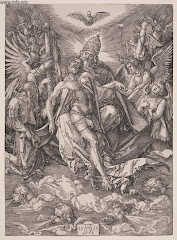I've been busy listening to past years of Issues Etc thanks to the downloading efforts at http://wittenbergmedia.org.
For my Lutheran friends and family who say I'm a lifelong Lutheran, but I don't agree with this or that, listen to Pastor Wilken as he talks about what it means to be a Lutheran. Do you understand what your denomination professes?
http://wittenbergmedia.org/audio/Im_a_Lutheran_But_-_Wilken.mp3
Wednesday, April 30, 2008
Thursday, April 24, 2008
Spirituality of the Cross - Having a Calling
Notes from Chap 5
The Spirituality of Ordinary Life
Having a Calling
- The Lutherans were the first to use 'vocation' to refer to secular offices and occupations.
- Behind the term is the notion that every legitimate kind of work or social function is a distinct 'calling' from God, requiring unique God-given gifts, skills, and talents.
- "God does not need our good works, but our neighbor does." Wingren in the Exposition of Psalm 147
- Strictly speaking, we do not "serve God' -- rather, He is always the one serving us; instead, we serve our neighbors.
- The vocation of marriage itself causes selfish human beings to care for each other and support each other more than they would on their own.
- The vocation of parenthood causes normally selfish adults to sacrifice their own needs for the well-being of their children.
- Our own sinful inclinations do not necessarily thwart the way God works in vocation.
- Essentially, your vocation is to be found in the place you occupy in the present.
- Vocations are multiple. Any given person has lots of vocations.
Spirituality of the Cross -- Vocation
Notes from Chap 5
Vocation
The Spirituality of Ordinary Life
- Luther described the various occupations -- parenthood, farming, laborers, soldiers, judges, retailers, and the life -- as all being "masks of God."
- In the doctrine of vocation, spirituality is brought down to earth to transfigure our practical, everyday life.
- God is sovereign over every aspect of His creation.
- Lutheran theology speaks of TWO kingdoms, that God rules both the spiritual and the earthly realms, though in different ways.
- In the spiritual realm, He works, as we have seen, through the Word and the Sacraments.
- In the earthly realm, He rules through vocation.
- God is providentially at work caring for His people, each of whom contributes according to his or her God-given talents, gifts, opportunities, and stations.
- God, who pours out His generosity on the just and the unjust, believer and unbeliever alike, hides Himself in the ordinary soical functions and stations of life, even the most humble.
- All of the vocations are thus channels of God's love.
- "God bestows all that is good on us," says Luther, "but...you must work and leand yourself as a means and a mask to God."
Sunday, April 20, 2008
Tuesday, April 15, 2008
Sunday, April 13, 2008
Good Shepherd Sunday
Today is Good Shepherd Sunday. It's the 4th Sunday after Easter. The readings for today:
Acts 2:42-47
1 Peter 2:19-25
John 10:1-10
Acts 2:42-47
1 Peter 2:19-25
John 10:1-10
The Shepherd and His Flock
1"I tell you the truth, the man who does not enter the sheep pen by the gate, but climbs in by some other way, is a thief and a robber. 2The man who enters by the gate is the shepherd of his sheep. 3The watchman opens the gate for him, and the sheep listen to his voice. He calls his own sheep by name and leads them out. 4When he has brought out all his own, he goes on ahead of them, and his sheep follow him because they know his voice. 5But they will never follow a stranger; in fact, they will run away from him because they do not recognize a stranger's voice." 6Jesus used this figure of speech, but they did not understand what he was telling them.7Therefore Jesus said again, "I tell you the truth, I am the gate for the sheep. 8All who ever came before me were thieves and robbers, but the sheep did not listen to them. 9I am the gate; whoever enters through me will be saved. He will come in and go out, and find pasture. 10The thief comes only to steal and kill and destroy; I have come that they may have life, and have it to the full.
Thursday, April 10, 2008
Spirituality of the Cross -- The Hidden Life
Notes from Chap 4
Spirituality of the Cross
The Hidden Life
The Hidden Life
- The Lutheran evangelical theology of the cross offers a theology of suffering, but more than that, it offers a practical, realistic and spiritually-dynamic paradigm for the Christian life.
- The theology of the cross is not asceticism.
- Bearing one's cross has to do precisely with the suffering that we do not choose for ourselves, the trials and difficulties that are imposed on us from the outside, that we have no control over whatsoever.
- Bearing the cross often has to do more with the petty, ordinary obstacles and frustrations of everyday life.
- Ironically, what in many traditions would be a sign of spiritual failure -- doubting one's election, feeling God's absence --- for Luther is a sign of the greatest sanctity, reserved (thankfully) for the spiritual giants.
- To believe in God's Word of promise, despite one's feelings, is faith. That is why all trials, both major and small, are occasions for the exercise of faith.
- "We live by faith, and not by sight." 2 Corinthians 5:7
- In the darkness, when we cannot see, we can only listen for God's voice, whereupon we can draw closer to the hidden God.
- When we are in desperate need, we pray with an intensity, a heartfelt passion, that is particularly genuine and authentic. Crying out to God in the depths of one's need is an act of faith and an occasion in which the hidden God who answers prayers draws closer.
- For now, it must be remembered that God is hidden -- that is, He cannot be seen or experienced -- in the crosses we bear, He is nevertheless genuinely present, a real presence grasped by faith.
- Luther speaks much of how our 'old man' is in conflict with our 'new man'. The baptized, converted sinner is given a new spiritual nature, a new life in Christ through the indwelling Holy Spirit.
- Only at death, when the flesh passes away, will this conflict be resolved, with the regenerated nature attaining full perfection when it enters eternal life. But in the meantime, the new man is hidden.
- God sees Christians through the prism of the cross: Our sins and failures are hidden by the blood of Christ; our ordinary lives are hidden, and we are robed by Christ's righteousness. When God looks at a Christian, He sees Jesus.
- God's Spirit is at work in the lives of every Christian, mysteriously changing the heart, acting with Word and Sacrament, ministering in trials and tribulations, creating someone who will stand before God in heaven as holy.
- But this process cannot be evident to the naked eye, nor can it be measured and tracked, nor is the Christian himself necessarily conscious of how far he has come.
Wednesday, April 9, 2008
From the Lutheran Book of Prayer -- Hard Times
Prayer during hard times:
Lord, have mercy. Christ, have mercy. Lord, have mercy.
Merciful Father, You know how difficult these days are me. In Your holy Word You have promised to hear those who cry unto You in the day of trouble. Listen to my cries for mercy and send me help from the sanctuary of Your grace. Preserve me from bitterness of spirit and rescue me from every temptation to despair. Calm my frustration with the knowledge that my life is secure in Your redeeming love, for I am baptized into the death and resurrection of Your Son. Draw me out of self-centered worry, which stifles faith, and cause me to take comfort in the great and precious promises that You have made to me and all believers in the Gospel. Sustain and strengthen me under every cross and affliction, that Your grace might be made perfect in my weakness. Give me confidence to pray without losing heart and to trust in Your mighty deliverance according to Your good and gracious will. Father, into Your hands I commend myself. Hear me, for the sake of Your Son, who alone is my Brother and Savior.
Amen
Lord, have mercy. Christ, have mercy. Lord, have mercy.
Merciful Father, You know how difficult these days are me. In Your holy Word You have promised to hear those who cry unto You in the day of trouble. Listen to my cries for mercy and send me help from the sanctuary of Your grace. Preserve me from bitterness of spirit and rescue me from every temptation to despair. Calm my frustration with the knowledge that my life is secure in Your redeeming love, for I am baptized into the death and resurrection of Your Son. Draw me out of self-centered worry, which stifles faith, and cause me to take comfort in the great and precious promises that You have made to me and all believers in the Gospel. Sustain and strengthen me under every cross and affliction, that Your grace might be made perfect in my weakness. Give me confidence to pray without losing heart and to trust in Your mighty deliverance according to Your good and gracious will. Father, into Your hands I commend myself. Hear me, for the sake of Your Son, who alone is my Brother and Savior.
Amen
Spirituality of the Cross -- Bearing the Cross
Notes from Chapter 4
Spirituality of the Cross
Bearing the Cross
Bearing the Cross
- Being helpless and utterly dependent, is precisely our spiritual condition.
- We are utterly helpless to save ourselves.
- We are to rest in utter dependence on Jesus Christ. "My grace is sufficient for you, for my power is made perfect in weakness." (2 Corinthians 12:9)
- The attitude of complete, self-sufficiency cannot only undermine faith, it can wreck God's design for human relationships.
- Both the Law and the cross drive us to an ever-deeper and more-intimate dependence on Jesus Christ, who meets our sin and our sufferings in His cross.
Spirituality of the Cross -- The Hiddenness of God
Notes from chapter 4
The Theology of the Cross
The Hiddenness of God
The Hiddenness of God
- The hiddenness of God is one of the most profound themes in Lutheran spirituality.
- To say God is hidden, of course, does not mean that He is absent. On the contrary, somewho who is hidden is actually present, just not seen.
- Coming to faith, involves being broken by the Law, coming to grips with our moral failure. Legalistic religions, in which one saves oneself by one's own efforts, are very specifically theologies of glory, optimistically assuming success and glorifying the powers of the successful, virtuous person.
- When we realize just how lost we are, then we cling to the cross, trusting Christ to do for us what we cannot do for ourselves. This is saving faith, the theology of the cross.
Friday, April 4, 2008
The Lord's Prayer
This is precious --- thanks Laura for putting it on your blog so I could find it and put it on my blog.
Thursday, April 3, 2008
Spirituality of the Cross -- Holy Communion
Notes on chap 3
Presence of God The Sacraments
Holy Communion
Holy Communion
- In our relationship with God, He is the one who acts. We do not seek Him: He seeks us. We do not love God: He loves us. (1 John 4:10)
- This action is OBJECTIVE. God comes to us from the outside. Though it is true that Christ and the Holy Spirit come to dwell in our hearts, they are not a mere function of our psychological state, our experiences, or our inward selves.
- Look to something OBJECTIVE and tangible: to the cross, to God's Word, to the immutable promises of God.
- Christianity has always affirmed the religious significance of the physical.
- The means of grace through which the Holy Spirit works on us to create faith and spiritual growth are evangelical. That is, they bear the Gospel of forgiveness through Christ.
- In the sacrament of Holy Communion, all of Lutheran spirituality is crystallized: God acts, objectively, through matter, embodying the Gospel and promising the forgiveness of sin. And, more than that -- or rather, making all of these efficacious --- is the real presence of Jesus Christ. This another astonishing claim, one which many Christians draw back from, but one that is at the pulsing heart of Lutheran evangelicalism.
- The Lutherans' exceedingly high view of the sacraments derives directly from their exceedingly high view of God's Word.
- The Lord's Supper is nothing less than the Gospel.
- God routinely feeds His people, with their daily bread and with Himself. It is His actions, and even our blindness or dull insensibility does not take anything away from His gifts.
- Without food, we would starve to death.
- The Gospel of Christ converts us, but it also nourishes us.
Subscribe to:
Comments (Atom)



